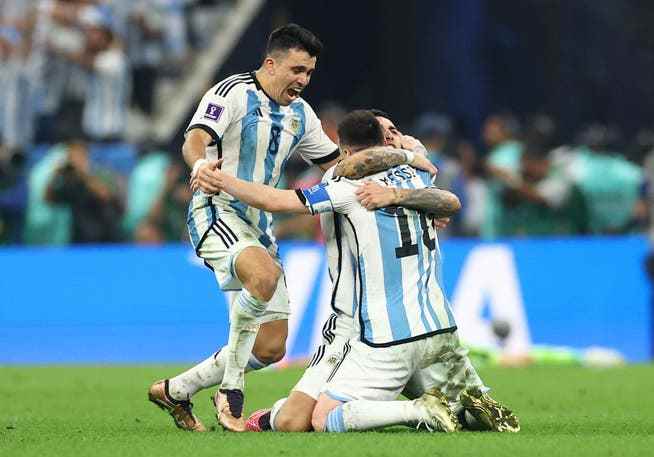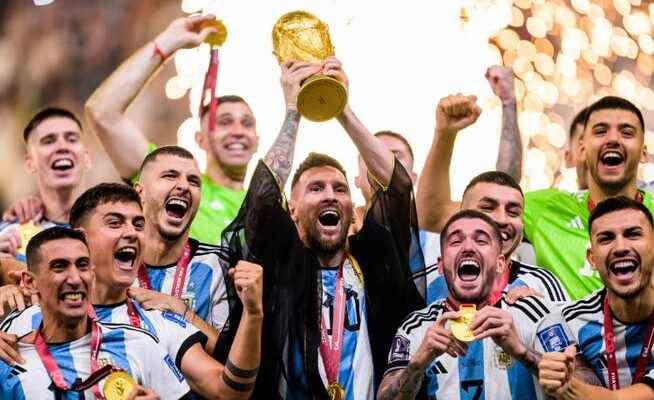The best footballer of today has reached the goal. Behind the outstanding player of this World Cup is a team without weaknesses – and with enormous mental strength.
Thanks to the World Cup title, he is now one of the greatest footballers in history: Argentinian Lionel Messi (centre).
Sometimes things happen on the football field that seem so dramatic, so surprising, so turbulent and so crazy that everyone who was there realizes in an instant that it is a privilege to witness this moment. A World Cup final in which the teams suddenly free themselves of all tactical shackles, which turns from a highly calculated performance by both teams into a spectacle, is unusual enough in itself, in fact hardly imaginable.
But when two of the greatest footballers the sport has ever seen face off and they strive to outdo each other at every moment, then you can certainly speak of the greatest World Cup final that has ever happened. The fact that Lionel Messi, the captain of the Argentine team, was finally able to lift the trophy seems like a stroke of fate. With a career that is so extraordinary, so dazzling and so successful. Only one thing was missing. That great title.
It even works with a duster
So now Messi has arrived. On a par with Maradona and Pelé, the very best, and with a performance that was good enough to give his team the decisive impetus. Argentina: It certainly wasn’t just Lionel Messi. But what would this Argentina have been like that evening without him?
A team full of good footballers, for sure, some of whom are outstanding, a team that can control a game. But would that have been enough to put the resurgent French in their place?
It almost went without saying that Messi took charge of the 1-0 penalty, but the way he gave his side a 3-2 lead in extra time showed a Messi rarely seen before.

Lionel Messi (right) becomes world champion in his last game for Argentina – after winning the penalty shoot-out, the South Americans’ jubilation knows no bounds.
Sometimes, it became clear at that moment, a player has to do things that are supposedly beneath his dignity if he wants to achieve his goal. It was a classic sweep that shocked the French, a goal that a limited center forward would score. Messi, the thief in the penalty area. He also reveals interesting facets in his old age.
It was a duel of superstars
It was his tournament, who would want to doubt that. Although the same could be said of his counterpart, his PSG team-mate Kylian Mbappé, who almost alone kept France in the game with his three goals. The team straightened up on Mbappé. Ultimately, however, it was the Argentines’ determination to overcome irritation that showed how solid they are as a team.
Playing confidently, not being upset, even if it goes against them: The Argentines had already demonstrated that in the match against the Netherlands, which also went to a penalty shoot-out. But just like in the quarter-finals, when two goals conceded came out of nowhere, the Argentine side managed to respond.
The ability not to get hectic when things threaten to get out of hand is what distinguishes a team of the highest possible quality. The fact that these Argentines were able to regenerate despite setbacks is also the achievement of a man who was never the center of attention at this World Cup: the coach Lionel Scaloni. He has formed an ensemble with no weaknesses but notable strengths. They may seem less spectacular than those of other teams. But therein lies its effectiveness. And perhaps it’s not far off the mark to say that this team’s greatest asset was sitting in the dugout.
ARGENTINA ARE WORLD CHAMPIONS!! ??#FIFAWorldCup | #Qatar2022
— FIFA World Cup (@FIFAWorldCup) December 18, 2022
Just as Messi can see himself as the direct descendant of Maradona, Scaloni is also in an interesting line of succession. Argentina national coaches were often originals: The flamboyant César Luis Menotti, a chain smoker with the aura of the intellectual who shaped the distinction between left and right-wing football, became world champion in 1978. Carlos Bilardo, a grumpy gynecologist who also knew something about football, achieved the triumph in 1986. It’s probably truer to say that Argentina won the world championship more with Maradona than with Bilardo.
The solitary José Pekerman was considered a genius, who left Germany in 2006 with perhaps the most talented Argentinian collective ever and immediately announced his resignation. Maradona, assisted by Bilardo, failed as a coach in 2010. Four years later, the initially ridiculed Alejandro Sabella almost won the title against Germany.
Scaloni’s direct influence
They were all distinctive types who stood out. Among them, Scaloni looks downright conservative, a man whose qualities may not have been discovered by the team, but first had to be discovered by the public. A trainer in a training jacket, a coach in work clothes, devoid of all vanity but obsessed with the game in its details.
Again and again he talked about balance at this World Cup, how important it is to bring things into balance. What he, the former youth coach with a direct line to Lionel Messi, managed to do miraculously. It was not a tournament of big egos, not even that of Lionel Messi stood out. Messi appreciated his privilege of interpreting his role in the way that befits a player who is mentioned in the same breath as the very greatest of footballers.
But Scaloni did even more. He shook the team after the opening defeat against Saudi Arabia, bringing in the 22-year-old center forward Julián Álvarez, an attacker who seemed unknown to some of his competitors: Álvarez’ commitment, his toxicity, but also his almost non-existent vanity left him open become the ideal partner of the spiritus rector Messi, for whom Álvarez created the space with his sprints that the multiple world footballer needed to implement his ideas.
It is difficult to single out a player from this framework. This team, which formed over the course of the tournament and grew from game to game, was too compact. They were prepared for all eventualities: in Emiliano Martínez they not only had a brilliant goalkeeper, but also a penalty specialist who was needed twice. In the end, this final was what the defining footballer of his time had hoped for: a coronation mass, with Argentina’s adversity surviving only making Messi’s triumph seem all the more impressive.
Argentina 3-3 France (2-2, 2-0) a.e.t., 4-2 pgs P
Lusail Iconic Stadium. – 88 966 spectators.– Referee: Marciniak (POL). – Gates: 23. Messi (foul penalty) 1-0. 36. Di Maria 2-0. 80. Mbappe (foul penalty) 2: 1. 81. Mbappe 2:2. 109. Messi 3:2. 118. Mbappé (hand penalty) 3: 3. – Penalty Shootout: Mbappe 0-1, Messi 1-1; Coman (Emiliano Martínez saves), Otamendi 2-1; Tchouaméni (misses), Paredes 3:1; Kolo Muani 3:2, Montiel 4:2.
Argentina: Emiliano Martinez; Molina (91st Montiel), Romero, Otamendi, Tagliafico (121st Dybala); Fernández; De Paul (103rd Paredes), Mac Allister (116th Pezzella); Messi, Álvarez (Lautaro Martínez 103), Di Maria (Acuña 64).
France: Lloris; Koundé (121st Disasi), Varane (113th Konaté), Upamecano, Théo Hernandez (71st Camavinga); Tchouameni; Griezmann (71st Coman), Rabiot (96th Fofana); Dembélé (41 Kolo Muani), Giroud (41 Thuram), Mbappé.
Remarks: Argentina complete. France without Benzema and Lucas Hernandez (both injured). Bookings: 45. Fernandez. 55. Rabiot. 87. Thuram. 90. Giroud. 90. Acuna. 114. Paredes. 116. Montiel. 120. Emiliano Martinez.
